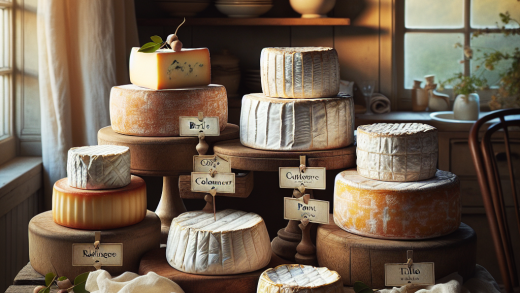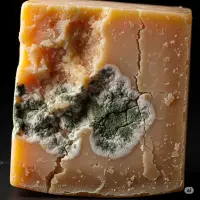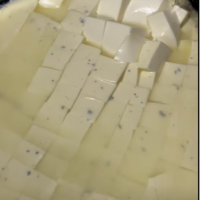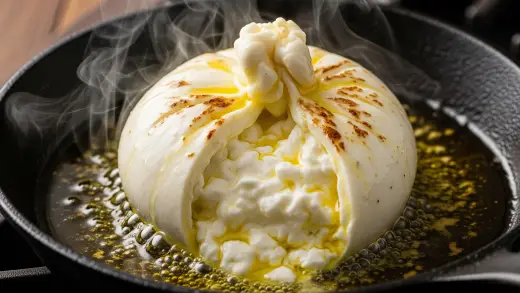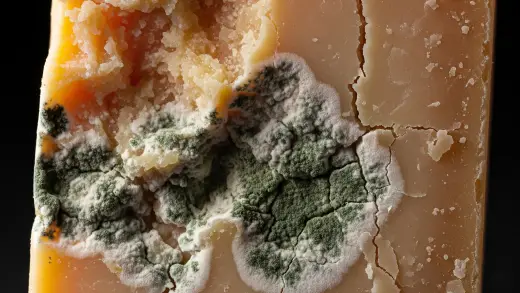Swiss cheese tastes bad to many people because of its strong and pungent flavor that can overpower other ingredients. The unique taste comes from propionic acid produced during the cheese-making process, which gives it a distinctive aroma and slightly nutty flavor.
Swiss cheese, also known as Emmental or Gruyere, is renowned for its iconic holes and semi-hard texture. The distinct taste results from the addition of propionic bacteria during fermentation, which leads to the production of propionic acid and carbon dioxide gas, creating the characteristic holes and unique flavor.
While some enjoy its nutty taste, others find it overpowering, making it a divisive cheese in the culinary world. Despite its strong flavor, Swiss cheese remains a popular choice for sandwiches and melting, as its unique taste can complement certain dishes when used in moderation.
Addressing The Swiss Cheese Aversion
Swiss cheese is often critiqued for its overpowering taste that can overshadow other flavors in dishes. The mass-produced domestic Swiss cheese is commonly criticized for its blandness, compared to the more flavorful real Swiss cheese. The propionibacteria used in Swiss cheese production contributes to its distinctive nutty and sweet flavor, but may also produce a dominating aroma.
Cultural Perceptions Of Swiss Cheese Flavor
Swiss cheese aversion often stems from cultural perceptions of its flavor. In some regions, Swiss cheese is believed to have a pungent and overpowering taste that can detract from the overall enjoyment of a dish. This can lead to a general aversion to the cheese, particularly when consumers encounter low-quality, mass-produced versions that lack the authentic flavor profile.
Myth-busting And Cheese Appreciation Education
A common misconception about Swiss cheese is that it lacks flavor, but this is not necessarily true. In fact, genuine Swiss cheese can offer a delightful nutty flavor profile, with subtle undertones that may vary based on factors such as aging and production methods. By dispelling these myths and educating consumers about the wide spectrum of flavor nuances in Swiss cheese, individuals can develop a greater appreciation for its unique taste and aroma.
Sensory Differences Across Palates
It’s important to recognize that taste preferences vary across different palates. While some individuals may find Swiss cheese unappealing due to certain flavor attributes, others may appreciate its distinct taste profile. Factors such as the presence of specific compounds like diacetyl, milk fat, and umami can influence consumer liking and disliking of Swiss cheese, highlighting the diverse sensory experiences that contribute to varying opinions about its flavor.

Credit: www.zicasso.com
Cheese Chemistry Breakdown
How Swiss Cheese Is Made
Swiss cheese, also known as Emmental or Emmentaler, is a type of cheese that is known for its characteristic holes, which are formed during the fermentation process. The cheese-making process begins with the coagulation of milk using rennet, an enzyme that causes milk to curdle. Once the curds form, they are cut and heated, and then the whey is drained. The remaining curds are then pressed into molds to form the cheese blocks. After this, the cheese is aged for several weeks or months, during which time the iconic holes develop.
Propionibacterium’s Role In Taste And Aroma
One of the key players in the creation of Swiss cheese is the Propionibacterium bacteria. This bacteria is responsible for producing carbon dioxide gas during the aging process, which forms the characteristic holes in the cheese. Additionally, as this bacteria consumes lactic acid, it creates compounds such as propionic acid and acetic acid, which contribute to the flavor and aroma of the cheese.
Understanding The ‘holes’ Phenomenon
The formation of holes in Swiss cheese is a unique phenomenon that occurs due to the presence of Propionibacterium during the aging process. As the bacteria produce carbon dioxide gas, it becomes trapped within the cheese, resulting in the formation of distinctive holes. This process is crucial to the texture and visual appeal of Swiss cheese, making it easily recognizable among other types of cheese.
Swiss Cheese Quality Spectrum
When it comes to Swiss cheese, there is a wide spectrum of quality that greatly influences its taste. From artisanal production methods to mass-produced alternatives, a range of factors impacts the flavor and characteristics of this beloved cheese. Additionally, the geographic origin of Swiss cheese plays a significant role in determining its unique taste and texture.
Artisanal Vs. Mass-produced Swiss Cheese
Artisanal Swiss cheese is crafted using traditional methods, often in smaller batches, allowing for greater attention to detail and flavor development. On the other hand, mass-produced varieties are typically manufactured on a larger scale, which can compromise the overall quality and complexity of the cheese.
Impact Of Production On Taste
The production process of Swiss cheese directly influences its taste. Artisanal cheese making involves meticulous care and adherence to time-honored techniques, resulting in cheeses with nuanced flavors and distinct characteristics. Conversely, mass production methods may prioritize efficiency over flavor, leading to a homogenized taste that lacks the depth and complexity found in artisanal Swiss cheese.
Geographic Influence On Cheese Characteristics
The geographic origin of Swiss cheese significantly contributes to its unique characteristics. Different regions have distinct environmental conditions, such as soil composition and climate, which impact the flavor profile of the cheese. Furthermore, the traditions and expertise of local cheese makers play a crucial role in shaping the specific taste and texture of Swiss cheese from different geographical areas.
Popular Swiss Cheese Pairings
Swiss cheese, known for its mild and nutty flavor with a characteristic smooth texture, pairs exceptionally well with a variety of foods and beverages. Enhancing the flavors of Swiss cheese with complementary foods and identifying recommended dishes and recipes can provide a delightful culinary experience. Additionally, pairing wines with Swiss cheese can elevate the taste and highlight the unique characteristics of this versatile cheese.
Enhancing Swiss Cheese With Complementary Foods
When it comes to enhancing the flavor of Swiss cheese, pairing it with complementary foods can create a harmonious and delectable combination. Here are some recommended foods to pair with Swiss cheese:
- Fresh fruits such as apples, pears, and grapes provide a sweet contrast to the mild flavor of Swiss cheese.
- Savory crackers or crusty breads contribute a delightful crunch and complement the smooth texture of Swiss cheese.
- Cured meats like prosciutto or salami offer a savory and salty component that balances the mildness of Swiss cheese.
- Honey or fig jam can add a touch of sweetness and enhance the nutty undertones of Swiss cheese.
Recommended Dishes And Recipes
Incorporating Swiss cheese into various dishes and recipes can showcase its versatility and delicious potential. Here are some recommended dishes and recipes featuring Swiss cheese:
- Classic Swiss cheese fondue, perfect for dipping bread, vegetables, and fruits for a communal and interactive dining experience.
- Swiss cheese and ham quiche, combining the creamy richness of Swiss cheese with savory ham in a delightful pastry crust.
- Grilled Reuben sandwich, featuring Swiss cheese, corned beef, sauerkraut, and Russian dressing on rye bread for a hearty and satisfying meal.
- Swiss cheese and mushroom stuffed chicken breast, a flavorful and elegant dish that highlights the creaminess of Swiss cheese.
Pairing Wines With Swiss Cheese
Pairing wines with Swiss cheese can elevate the tasting experience and accentuate the unique flavors of both the cheese and the wine. Here are some wine recommendations for pairing with Swiss cheese:
| Wine Type | Recommended Varietal |
|---|---|
| White Wine | Chardonnay or Sauvignon Blanc |
| Red Wine | Pinot Noir or Merlot |
| Sparkling Wine | Brut Champagne or Prosecco |
Pairing Swiss cheese with the right wine can enhance its creamy texture and nutty flavor profile, creating a delightful taste synergy.
Why Does Swiss Cheese Taste Bad : Uncovering The Culinary Mystery
Swiss cheese has long been a subject of debate among cheese enthusiasts, with many expressing dissatisfaction with its flavor. Descriptions such as “horrible pungent” and “smells like bad breath” are commonly associated with Swiss cheese, leading to a universally shared belief that it does not live up to the flavor profile of other popular cheese varieties.
Several factors contribute to the perceived blandness of Swiss cheese. The industrial production of domestic Swiss cheese often leads to a lack of robust flavor. Additionally, the use of propionibacterium, a bacteria typically associated with an unpleasant odor, does not contribute significantly to enhancing the taste profile of the cheese.
Despite its divisive nature, Swiss cheese continues to hold a place in culinary arts, particularly in sandwich making. However, the future prospects of Swiss cheese in the culinary world depend on its ability to evolve and meet the discerning palates of consumers. With a focus on enhancing flavor profiles and exploring innovative production methods, Swiss cheese could potentially carve out a new identity and secure its position as a favored ingredient for future generations of food enthusiasts.
Frequently Asked Questions On Why Does Swiss Cheese Taste Bad
Why Does Swiss Cheese Taste So Different?
Swiss cheese tastes different due to the propionibacteria consuming lactic acid, releasing gases, and developing the “eyes. ” These bacteria also contribute to its nutty and sweet flavor. However, mass-produced Swiss cheese may lack flavor due to the use of different techniques.
How Do You Make Swiss Cheese Taste Better?
To make Swiss cheese taste better, season with salt, pepper, and nutmeg, add to mac and cheese, or use as a crunchy topping for extra flavor.
Is Swiss Cheese A Good Cheese To Eat?
Yes, Swiss cheese is a good cheese to eat. It has a unique nutty and sweet flavor that can enhance various dishes.
Why Does My Cheese Have A Weird Taste?
The taste of Swiss cheese may be affected by bacteria, mass production, or storage. Proper handling and serving can enhance its flavor.
Why Does Swiss Cheese Smell So Bad?
Swiss cheese has a strong smell due to the propionibacterium bacteria used to create the holes, which can affect its taste.
Why Does Swiss Cheese Taste Less Flavorful?
Mass-produced domestic Swiss cheese lacks flavor, while good Swiss cheese actually has more flavor than most cheeses.
Why Is Swiss Cheese Less Liked By Some People?
Swiss cheese is disliked due to its pungent aroma and overpowering taste that diminishes other sandwich flavors.
Conclusion
The unique flavor of Swiss cheese is a polarizing topic but often adds a distinct richness. Despite its pungent smell and mild taste, many enjoy its nutty, sweet flavors. While some may find it overpowering, others appreciate its subtlety and use it in cooking for added depth.

